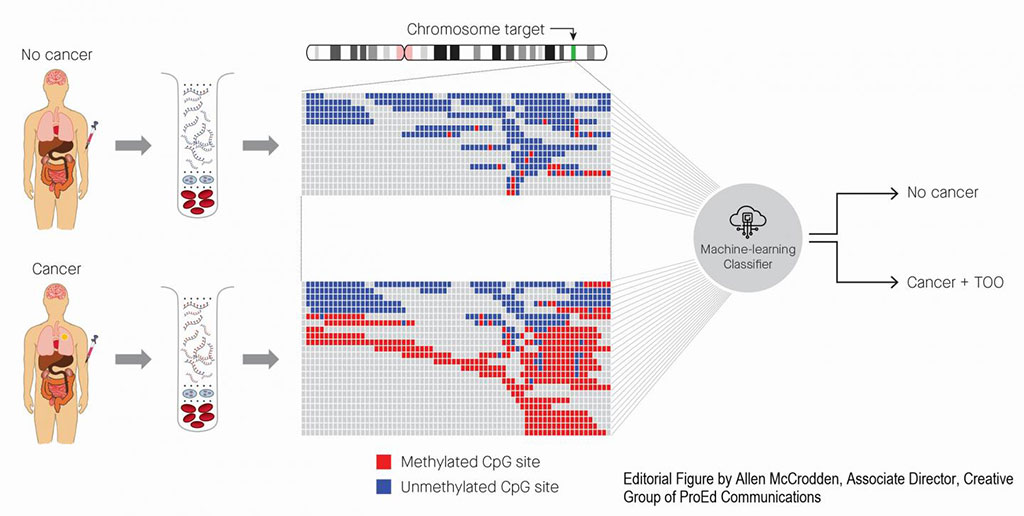Early Tumor Detection by Analysis of Circulating Free DNA Methylation Patterns
By LabMedica International staff writers
Posted on 08 Apr 2020
A blood test that analyzes patterns of methylation in circulating free DNA was shown to be capable of simultaneously detecting and localizing more than 50 types of cancer.Posted on 08 Apr 2020
It is a given that methods for early cancer detection, which would identify tumors when better outcomes could be expected and treatment would be less drastic, are urgently required.

Image: Cell-free DNA is isolated from blood samples drawn from a patient without cancer (top) or with cancer (bottom), and subjected to a targeted methylation sequencing assay. Sequencing results identifying methylated (red) or unmethylated (blue) CpG regions are fed into a machine-learning classifier that can identify the presence or absence of cancer, as well as identify the tissue of origin (Photo courtesy of Allen McCrodden, associate director, Creative Group of ProEd Communications)
In this regard, investigators from the Dana-Farber Cancer Institute (Boston, MA, USA) and the Mayo Clinic (Rochester, MN, USA) assessed the performance of targeted methylation analysis of circulating cell-free DNA (cfDNA) to detect and localize multiple cancer types across all stages of the disease.
For the study, the investigators utilized technology developed by GRAIL, Inc. (Menlo Park, CA, USA) to analyze 6,689 blood samples, including 2,482 from cancer patients and 4,207 from healthy controls. The patient samples represented more than 50 cancer types, including breast, colorectal, esophageal, gallbladder, bladder, gastric, ovarian, head and neck, lung, lymphoid leukemia, multiple myeloma, and pancreatic cancer.
Results revealed that the overall specificity of the analysis was 99.3% (only 0.7% of the results were false positives). The sensitivity of the assay for 12 cancers that account for nearly two-thirds of cancer fatalities in the United States was 67.3% (a third of the time the test returned a false negative result). Within this group, the sensitivity was 39% for patients with stage I cancer, 69% for those with stage II, 83% for those with stage III, and 92% for those with stage IV. The stage I-III sensitivity across all 50 cancer types was 43.9%. When cancer was detected, the test correctly identified the organ or tissue where the cancer originated in more than 90% of cases.
"Our previous work indicated that methylation-based tests outperform traditional DNA-sequencing approaches to detecting multiple forms of cancer in blood samples," said contributing author Dr. Geoffrey Oxnard, a medical oncologist at the Dana Farber-Cancer Institute. "The results of this study suggest that such assays could be a feasible way of screening people for a wide variety of cancers. Our results show that this approach to testing cell-free DNA in blood can detect a broad range of cancer types at virtually any stage of the disease, with specificity and sensitivity approaching the level needed for population-level screening, The test can be an important part of clinical trials for early cancer detection."
The study was published in the March 30, 2020, online edition of the journal Annals of Oncology.
Related Links:
Dana-Farber Cancer Institute
Mayo Clinic
GRAIL, Inc.













